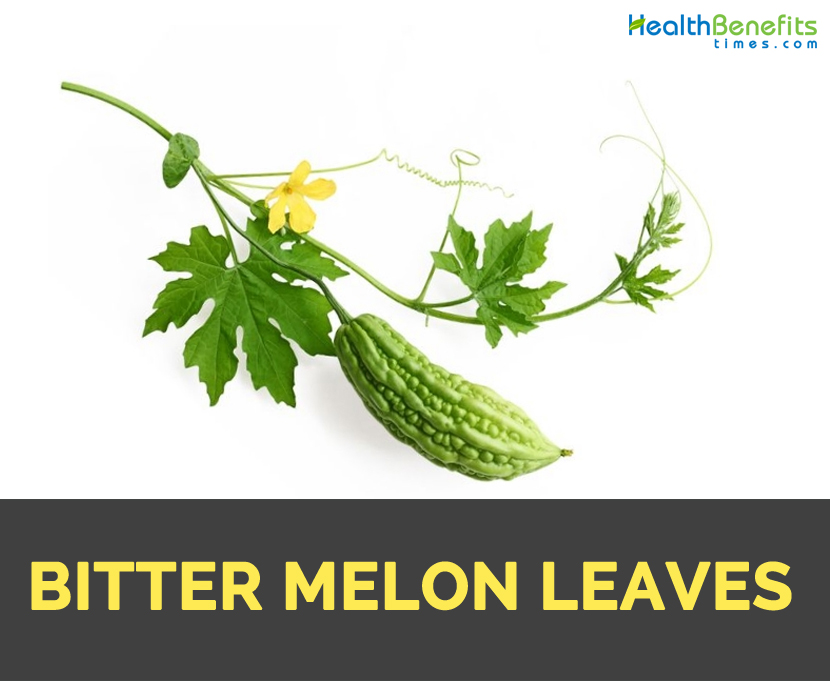| Bitter Melon leaves Quick Facts |
| Name: |
Bitter Melon leaves |
| Colors |
Bright green to light green |
| Shapes |
Alternate, 4-12 cm (1.6-4.7 in) across |
| Taste |
Bitter |
| Calories |
20 Kcal./cup |
| Major nutrients |
Vitamin K (78.83%)
Vitamin B6 (58.46%)
Vitamin C (35.78%)
Vitamin B9 (22.00%)
Vitamin B2 (21.69%)
|
Bitter melon leaves grow on herbaceous vine and attached to vine with long and thin stems. Leaves are medium in size about 4 to 12 centimeters wide and are made up of 3 to 6 veined lobes having jagged edges. Tender ones are bright green to light green and are pliable as well as soft. The leaves are also bitter in flavor.
Botanically bitter melon leaves are classified as Momordica charantia and is the member of Cucurbitaceae. Bitter melon is a tropical vine which is extensively found throughout Africa, Caribbean, India, China and Southeast Asia. Leaves are dried, encapsulated and steeped in hot water to make which is used traditionally for treating hypertension, malaria, diabetes, gastrointestinal disorders and asthma. The herb has various beneficial properties. It is also used for treating diabetes, rheumatism, dysentery, gout, respiratory ailments and viral disease.
Leaves possess anti-hyperglycaemic, anti-diabetic, anti-oxidant, anthelminthic, emetic, anti-microbial, anti-hepatotoxic, purgative, antiviral and anti-ulcerogenic properties. In some countries, decoction or tea prepared from bitter melon leaves are also used as aphrodisiac and used by women as birth control.
Culinary uses
- Bitter melon leaves are used for boiling, sautéing and stewing.
- In Philippines, leaves are served with rice and mung beans in dish which is known as ginisang monggo.
- Bitter melon leaves are added to stir-fries, curries and soups.
- Leaves are used to form beer and tea.
- The delicate leaves are added to salads.
Medicinal Uses
Bitter gourd leaves are used for treating various diseases such as piles, diabetes, cholera, respiratory ailments and skin eruptions.
Boil two glass of water with six tablespoon of chopped bitter gourd leaves for about 15 minutes. Don’t cover the vessel. Let it cool down and then strain. Drink this mixture 1/3 cup of it thrice a day. Leaf decoction manages type 2 diabetes and keeps blood sugar in check.
Mix teaspoon of bitter melon juice with glass of buttermilk. Take this every morning on empty stomach for about a month. Apply the leaves paste over haemorrhoids.
Intake 10 to 15 ml of Bitter gourd leaves which is useful for treating diarrhea and cholera.
- Asthma, common colds, bronchitis, pharyngitis
Mix the paste of bitter melon leaves with equal amount of tulsi leaves. Take this with honey each morning. It is used to prevent respiratory problems.
Intake 10 to 15 ml juice of Bitter gourd leaves is helpful for arthritis.
Take 10-15 ml juice of leaves and honey.
Drink 10 to 15 ml juice of bitter gourd leaves and big chebulic myroblan.
- Intestinal parasites, measles, pox, Pneumonia
Drink 10 to 15 ml Bitter gourd leaves.
- Boils, burns and skin eruptions
Apply the powdered Bitter gourd leaves topically to the affected areas.
- Burning sensation in hands and feet
Apply bitter gourd juice topically in the burning sensation in hands and feet.
Bitter melon leaves are loaded with vitamins and minerals such as calcium, iron, vitamin B and phosphorus.
Side-effects/Warning
- Avoid its uses during pregnancy as it stimulates uterine smooth muscle contraction resulting abortion.
- Tea made with bitter gourd leaf increases rate or force of contraction and affects heart.
- Excess intake of bitter gourd leaves causes vomiting and loose motion.
References:
https://www.specialtyproduce.com/produce/Bitter_Melon_Leaves_8971.php
https://www.bimbima.com/ayurveda/bitter-gourdkarela-leaves-medicinal-uses/278/
Comments
comments


